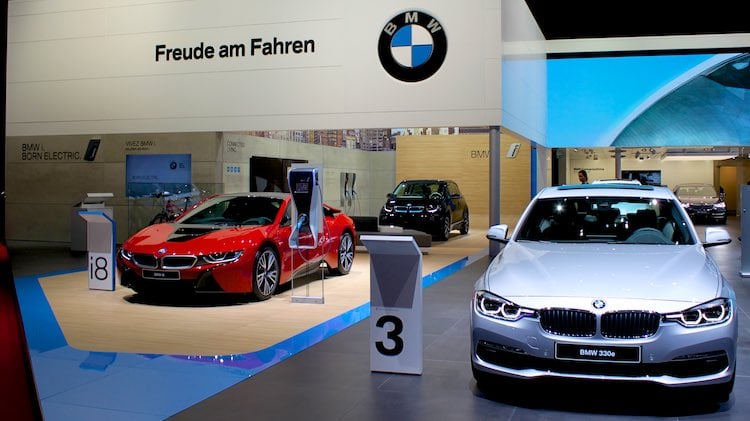 March 2016: Sales of electric cars in Germany contracted while sales of hybrid cars, and especially plug-in hybrid vehicles, continued to increase. During the first quarter of 2016, new electric passenger vehicle registrations were flat compared to a year ago while hybrid car registrations were up by more than a quarter with plug-in hybrid car registrations up by nearly 50%. The German new car market was flat in March, partly due to fewer working days with Easter falling in March in 2016 compared to April in 2015.
March 2016: Sales of electric cars in Germany contracted while sales of hybrid cars, and especially plug-in hybrid vehicles, continued to increase. During the first quarter of 2016, new electric passenger vehicle registrations were flat compared to a year ago while hybrid car registrations were up by more than a quarter with plug-in hybrid car registrations up by nearly 50%. The German new car market was flat in March, partly due to fewer working days with Easter falling in March in 2016 compared to April in 2015.
Electric and Hybrid Car Registrations in Germany in 2016
New passenger vehicle registration data for electric, hybrid and plug-in hybrid cars released by the KBA show the following numbers for Germany in 2016:
| Electric | % Change | Hybrid* | % Change | Plug-in | % Change | |
| January | 477 | -27.6 | 2,814 | 48.7 | 976 | 64.6 |
| February | 751 | 72.2 | 3,530 | 71.3 | 1,237 | 80.3 |
| March | 1,104 | -13.6 | 4,045 | 28.4 | 1,290 | 45.6 |
| 2016 (Q1) | 2,332 | -1.7 | 10,389 | 46.2 | 3,503 | 61.8 |
| 2015 (Full Year) | 12,363 | 45.1 | 33,630 | 22.6 | 11,101 | 145.2 |
| 2014 FY | 8,522 | 40.8 | 27,435 | 4.1 | 4,525 | 226.7 |
| 2013 FY | 6,051 | 104.7 | 26,348 | 23.0 | 1,385 | |
| 2012 FY | 2,956 | 21,438 | ||||
| *Plug-in Hybrids are included in the hybrid total as well. | ||||||
Electric Car Sales in Germany in 2016
In March 2016, electric car sales in Germany were again weaker than in the corresponding month a year ago. After a sharp increase in registrations in February (+72%), March sales were again lower. Electric car sales in March 2015 were exceptionally high at the time but not compared to the final quarter of 2015. Although March 2016 was the first month this year that electric car sales exceeded a thousand cars for the month, the actual numbers remained dismally low.
New electric passenger vehicle registrations for the first quarter of 2016 in Germany amounted to only 2,332 cars compared to 402,438 petrol and 374,747 diesel cars. This gave electric cars a 0.3% share of the total German new car market.
The sale of electric cars in Germany remained low partly due to uncertainty of possible subsidies that would punish buyers that purchase now, as well as the fear that newer technology could make an electric car absolute within a few years. For most private drivers, a standard car remained the sound financial and practical choice with electric cars in Germany mostly part of larger fleets and car sharing schemes.
Hybrid Car Sales in Germany in 2016
The sales of hybrid cars in Germany continued to increase in all months of 2016 compared to a year ago. Hybrid car sales increased by nearly half during the first quarter of 2016 to take a 1.3% share of the total German passenger car market. Plug-in hybrid sales increased even faster with the first quarter numbers up by 62% and registrations well ahead of purely electric cars.
The clear preference in Germany for plug-in hybrids over standard electric cars is largely as predicted by German carmakers. Plug-in hybrids offer much of the advantages of electric cars without leaving drivers with the negatives of long recharging periods or worse, running out of power altogether.
As with the sales figures, the necessary infrastructure for electric cars in Germany is lacking behind the efforts made by several of its smaller neighbors.
